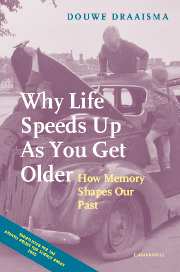Book contents
- Frontmatter
- Contents
- List of illustrations
- Acknowledgments
- 1 ‘Memory is like a dog that lies down where it pleases’
- 2 Flashes in the dark: first memories
- 3 Smell and memory
- 4 Yesterday's record
- 5 The inner flashbulb
- 6 ‘Why do we remember forwards and not backwards?’
- 7 The absolute memories of Funes and Sherashevsky
- 8 The advantages of a defect: the savant syndrome
- 9 The memory of a grandmaster: a conversation with Ton Sijbrands
- 10 Trauma and memory: the Demjanjuk case
- 11 Richard and Anna Wagner: forty-five years of married life
- 12 ‘In oval mirrors we drive around’: on experiencing a sense of déjà vu
- 13 Reminiscences
- 14 Why life speeds up as you get older
- 15 Forgetting
- 16 ‘I saw my life flash before me’
- 17 From memory – Portrait with Still Life
- Index of names
8 - The advantages of a defect: the savant syndrome
Published online by Cambridge University Press: 22 September 2009
- Frontmatter
- Contents
- List of illustrations
- Acknowledgments
- 1 ‘Memory is like a dog that lies down where it pleases’
- 2 Flashes in the dark: first memories
- 3 Smell and memory
- 4 Yesterday's record
- 5 The inner flashbulb
- 6 ‘Why do we remember forwards and not backwards?’
- 7 The absolute memories of Funes and Sherashevsky
- 8 The advantages of a defect: the savant syndrome
- 9 The memory of a grandmaster: a conversation with Ton Sijbrands
- 10 Trauma and memory: the Demjanjuk case
- 11 Richard and Anna Wagner: forty-five years of married life
- 12 ‘In oval mirrors we drive around’: on experiencing a sense of déjà vu
- 13 Reminiscences
- 14 Why life speeds up as you get older
- 15 Forgetting
- 16 ‘I saw my life flash before me’
- 17 From memory – Portrait with Still Life
- Index of names
Summary
In 1887, the English psychiatrist John Langdon Down delivered a series of lectures to the London Medical Society. He listed for his colleagues the cases and pathologies he had come across during the previous thirty years as medical director of Earlswood Asylum. These lectures have become a landmark in the history of psychiatry, thanks chiefly to Down's account of an abnormal mental condition to which he himself referred as ‘mongolism’, but which is currently known as Down's syndrome. Far less well known is the fact that in the same lectures he introduced another classical psychiatric term: idiots savants; according to Down, these were ‘children who, though of low general intelligence, possess an unusual faculty capable of considerable development’.
In his clinic, Down was able to observe such children. One mentally handicapped boy was able to recite long passages word for word that he had read just once, although there was no question whatever of his having any real understanding of what he was remembering. When he read Gibbon's History of the Decline and Fall of the Roman Empire, he accidentally skipped a line on the third page but reinstated it a few lines later. When he came to recite the passage from memory, he repeated the mistake: he missed a line, read on, and then read the missing line as if it had always been in that position. Another boy knew the entire Book of Psalms by heart. Yet another was able to multiply two three-figure numbers in a few seconds.
- Type
- Chapter
- Information
- Why Life Speeds Up As You Get OlderHow Memory Shapes our Past, pp. 73 - 97Publisher: Cambridge University PressPrint publication year: 2004



